Has Trump broken the special relationship?
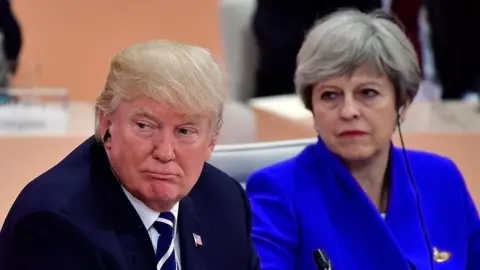 Getty Images
Getty ImagesIn two months' time US President Donald Trump will finally make his long-delayed visit to Britain.
There will be discussion about how much time he spends with the Queen, whether he holds Theresa May's hand as firmly he did at the White House last year and where he plays a round of golf. Many column inches will be wasted on why he has yet to be granted a full state visit.
Some Britons will use their right to free speech to let him know what they think of his presidency. There will be much analysis about what this all means for Britain's relationship with the United States. And the brutal answer will be: "Not much."
For the UK-US relationship is rarely about individual visits and personal relationships between leaders. Some high level relations are warm, others cool. It did not matter in 2001 that George Bush and Tony Blair shared the same toothpaste - what mattered was their shared view on invading Iraq.
When President Carter in 1977 committed a grievous breach of protocol by kissing the Queen Mother on the lips - something that had not happened since the King died in 1952 - the hotline between London and Washington was not cut in a fit of diplomatic pique.
What mattered then and matters now is the substance, the decisions the UK and the US take that affect their national interests. And right now, some diplomats believe the decisions that President Trump is taking pose a great threat to transatlantic relations.
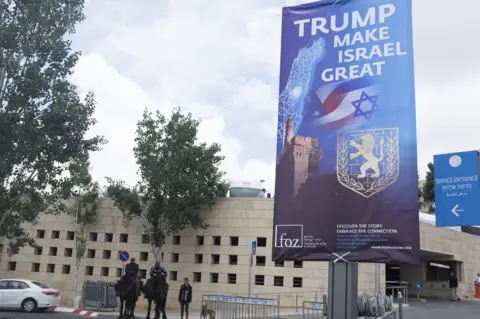 Getty Images
Getty ImagesThe British government, for example, firmly opposes his decision to move the US embassy in Israel from Tel Aviv to Jerusalem. MP after MP felt able to stand up in the House of Commons this week and criticise the US and its response to the violence in Gaza.
Alistair Burt, the normally soft-spoken Foreign Office Minister, openly criticised the US as a "valued partner who does not always get it right" - ouch. A few years ago this degree of parliamentary criticism of the US would have been unusual. But Mr Trump's presidency has made it unexceptional.
Since the president's decision last week to withdraw from the Iran nuclear deal, I have been struck not just by how much it angered and depressed European diplomats and politicians, but also by how much they believe it has damaged - and will continue to damage - transatlantic relations.
One senior official told me: "This is the biggest rift between Europe and the US since 2003 and Iraq." The initial joint statement from the three Ms - Theresa May, Angela Merkel and Emmanuel Macron - set the tone when they expressed their "regret and concern" at Mr Trump's decision. This is not the usual language of allies.
And this fury was not directed solely at what they considered to be a foreign policy mistake. That is common enough. Diplomacy is an art, not a science, and allies often differ in their analysis.
What angered European diplomats so much was the utter lack of any plan B.
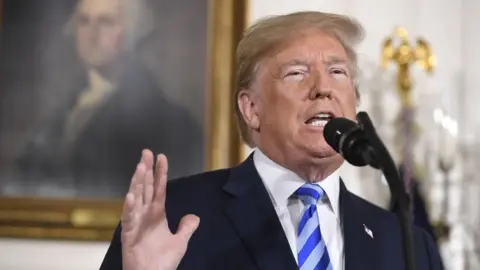 AFP/ Getty Images
AFP/ Getty ImagesThey asked the Americans what they planned to do to start discussing a wider deal to encompass Iran's regional interference and its ballistic missiles as well as a renewed constraint on its nuclear programme. But Washington had nothing to say.
The British Foreign Secretary, Boris Johnson, reflected some of this frustration in the House of Commons when he said no fewer than seven times in one debate that it was now up to the US to say what it wanted to do. When he met his French counterpart in London this week, Mr Johnson told me he wanted to "interrogate" the Americans about their plans for Iran.
There is a real reluctance among European diplomats to offer up solutions and ideas to the US. They say Iran is now the United States's problem, citing the so-called "Pottery Barn rule", a reference to the old American shop slogan: "If you break it, you have bought it." They refer dismissively to the US promise of sanctions as "one club" diplomacy.
One very senior source in the British government said this to me: "Trump has thrown all this stuff in the air. But it is mad to think you can have a deal that includes what Iran is doing in Syria, Yemen, its missiles and the nuclear stuff. It is never going to happen.
"The Americans can't expect us to follow them round with a dustpan and brush putting Humpty Dumpty back together again."
So the Europeans now have a real decision to make.
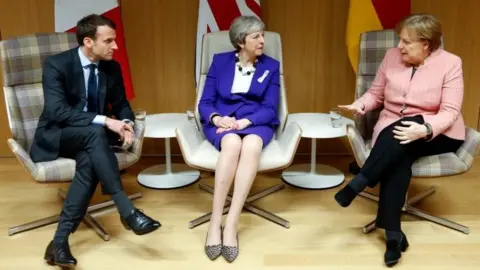 AFP
AFPWill they allow this anger towards the US to shape what they do next to try to save the nuclear deal? How hard will they push back against the US sanctions that may catch European companies doing business with Iran? EU-wide legislation to exempt EU companies? Counter sanctions against US companies? A full blown trade war? I doubt it.
Some of these options are being mulled in Brussels, but the talks among foreign ministers this week were more prosaic, looking at what can help European businesses rather than punish the US. Many diplomats expect that eventually the EU and its businesses will bow to the inevitable and choose US markets over a nuclear deal with Iran.
Yet the consequences of this will not only push Iran closer to China and Russia - which will willingly scoop up all the trade abandoned by the Europeans - but they may also leave a lingering resentment towards the US across the continent.
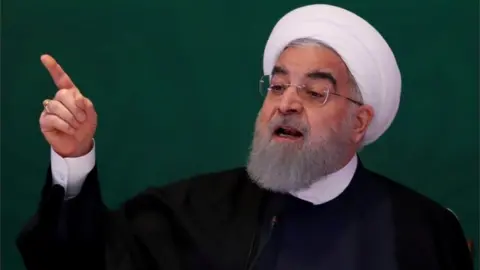 Reuters
ReutersA key ally will be seen as having acted directly against the UK national interest, which no amount of hyperbole about the "special relationship" will be able to conceal.
There is a small line of silver on this diplomatic cloud. Britain now finds itself closer to its key European allies than it has been for some time, and certainly closer than had been expected at this stage of the Brexit negotiations.
The head of the Foreign Office, Sir Simon McDonald, openly points out that the UK is now aligned with its European allies on the Paris climate change accords, the Iran nuclear deal and the location of embassies in Israel. The subtext is that these are all issues where the UK is not aligned with the US.
But this is a small return for Britain falling out with its primary global ally. Right now UK-US relations are in need of repair.
Prince Harry may be doing his bit for transatlantic diplomacy by welcoming an American national into the House of Windsor. But it will take more than a royal wedding to assuage the anger that President Trump's decisions have caused.
